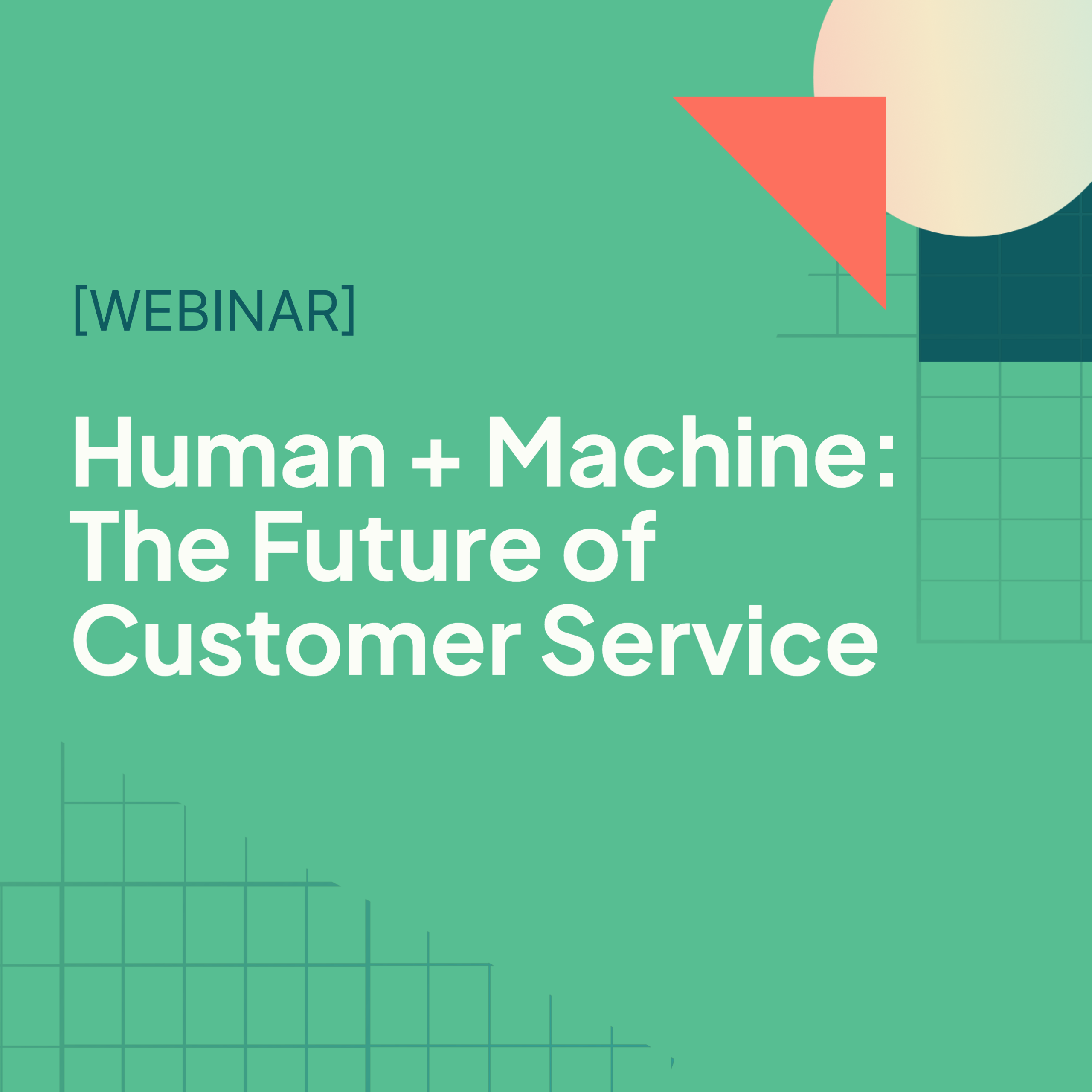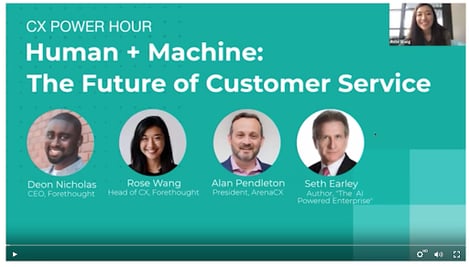

Most of us have heard about "the rise of chatbots". But what does this really mean for the future of customer service and how will it impact our daily operations in the near and long-term futures?

We sat down with top CX leaders, Deon Nicholas, CEO and Co-founder of Forethough.ai, Seth Earley, CEO and Founder of Earley Information Science, and ArenaCX's very own CEO and Co-founder, Alan Pendleton, to discuss what the future of customer service looks like and how much of a role machines will play in it.
Discussion Highlights & CX Takeaways
How Artificial Intelligence is Used in Customer Service Today.
.png?width=69&name=Headshot_Rose%20(1).png) Rose:
Rose:
"I always like to start and establish a baseline. So Alan, how is AI being deployed in customer service today? What does AI do better? And what do humans do better??"
 Alan:
Alan:
"Well, Rose, in 2019, I did a little research where I searched for startups that were tagged as conversational AI for customer service and that had received venture funding that year. And I found ,if I recall, about 40 companies, and that was just the VC funded ones. I'd hazard a guess it's a lot higher number than that. So my point in saying this is I can't possibly touch on all the exciting, fascinating use cases probably being worked in the world by all the AI shops out there.
But here's what I'm seeing. So we have AI for operations, and AI for conversations.
AI for operations is using natural language processing and machine learning to automatically tag and triage incoming customer operations to build better demand forecasts using machine learning to route and distribute workload optimally among teams and to empower agents with recommended knowledge and responses.
AI for conversations are the customer facing chat bots and interactive workloads we all see online when we when we're logging a ticket with a brand.
So personally, I think AI for operations is more mature, and is a great use for this amazing technology. It can distribute workload smartly and set up humans for success. AI for conversations is going to get there, but it's still improving. It's working on empathy. It's working on learning nonverbal cues and cultural differences. It's getting better, but for really sensitive customer issues today, I'd still trust a human."
How to Identify the "Gold Standard" AI Companies.
.png?width=69&name=Headshot_Rose%20(1).png) Rose:
Rose:
"When you talk about, AI can look at your tickets, read it, triage it... A lot of AI companies today say they can do these things.
We can read sentiment, we have an understanding conversationally of what the customer wants, we can build workflows. In this ever growing crowded space, how are people supposed to really understand what is the difference between [an AI company] who says I can route tickets one way versus another... what is what is the gold standard [brands should be looking for]?"
.png?width=69&name=Deon_Headshot%20(1).png) Deon:
Deon:
"If I'm a customer or a customer service practitioner, how can I tell the difference? A very good question you can ask is, well, one, what is implementation like? Because you'll find that with true AI systems, implementation gets a lot easier, because we can read your conversation history and build models on top of that.
But you'll find a lot of traditional systems are built around this concept of a decision tree, well, you got to go and train the model, you got to go and build out all these rules. So that's one of the things that I would ask, and I'm sure there's a lot more there. But those are, that's one of the really quick ways you can start to suss out whether it's more traditional chatbot based or traditional systems or a modern AI based solution."
The Importance of Quantity and Quality of Data When Preparing Yourself for AI.
.png?width=69&name=Headshot_Rose%20(1).png) Rose:
Rose:
"So much of AI is we need a past to predict the future. If there's no past, how can we predict? Companies need to prepare their data, they need to have data. What is preventing companies from being prepared that you see?"
.png?width=69&name=Seth_Headshot%20(1).png) Seth:
Seth:
"Sure. So there's a lot of challenges. And one is that all of these algorithms run on data. At the end of the day, it's about data, right? You need data. In order to drive these things. If you have crappy data or junk data, you're going to get a poor result.
We run into the same intractable evergreen problems and they're typically around data. In fact, semantic search and intent: classification is really, in many cases to make up for our sins in past content management and data management, right, because we use different terms to describe things are tagged things in different ways.
But again, that's the nature of humans, humans are creative in both the way they solve problems and the way they present problems or characterize problems. So we're always going to have that challenge. But at the end of the day, we need to curate data, we do need to have good data.
There's a big misconception that AI is going to fix your data. Well, it can go a long way to helping to clean it up. But you still need a reference architecture, you still need terminology that describes your services, your products, your problems, your solutions — an AI is not going to know highly specialized knowledge or information about your products, especially if you have a complex set of products and solutions. So we have to be able to understand that, curate it, manage it."
When is the Right Time for a Company to Adopt AI?
.png?width=69&name=Headshot_Rose%20(1).png) Rose:
Rose:
"I think a big question for customers is, well, then where am I in the adoption curve? Am I an early adopter? Do I want to wait for other companies to test this out and come along when AI is further developed? How does a company assess what risks they can and cannot take and when to actually adopt AI? I really want to make sure that companies feel comfortable that they understand what their risk is and where they want to come along in the adoption cycle. "
 Alan:
Alan:
"Yeah, I mean, I think any customer experience overhaul brings some degree of risk. If you consider AI, it's a resource. Just like [with] a BPO [versus] an in-house team: the question is, can this resource perform at a level that is competitive with the rest of the rest of the resource pool and therefore serve as a suitable complement to the capacity that's needed to deliver the experience they want?
So I think there's going to be trepidation no matter which resource you add is kind of the first statement I would make about it. And I wouldn't necessarily hold AI to radically different standard than to adding a human team.
As long as the organization remains nimble and flexible to adjust. If a human team is failing due to lack of training, or some other capacity issue they may be facing. The flexible, resilient organization is going to have a contingency plan to route that traffic to a different resource.
The same should be true for AI, you plug it in and it's failing you should be able to have a fallback to humans or even have two API's and competition and the one that does better gets the traffic. So there's ways to approach risk mitigation to enter this. But that's kind of a macro statement.
And then in the micro view of it is you have to have the data sets, as Seth said. There's got to be a starting point, and how will this machine interpret who you are as a business? Information Architecture needs to be there. And so if there's no starting point to ground the AI in your your business data set, then it's going to struggle to learn. And so humans can play a role in feeding it, training it and tuning it to de risk, improve its ability to be successful."
Interested in hearing more from Alan, Deon, Seth, and Rose? This barely scrapes the service of how AI is expected to play a role in the future of customer service. Watch the full recording of this exciting panel discussion at the link below.
Or get in touch with our team to learn more about ArenaCX.
Subscribe and stay up to date
receive essential emails.







Speak Your Mind